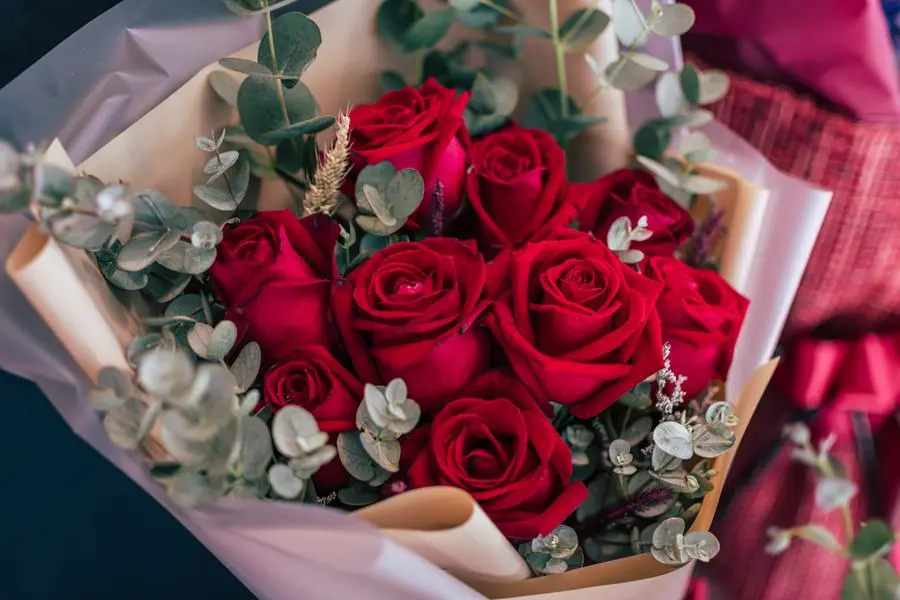PHOTO
It's Valentine's Day tomorrow and prices of flowers in Dubai have increased by 30 per cent this month. While Valentine's Day falls on February 14, the anticipation for the day typically builds in the first week of the month, leading up to beginning of the seven days of love starting on February 7.
These seven days of love are Rose Day on February 7, Propose Day on February 8, Chocolate Day on February 9, Teddy Day on February 10, Promise Day on February 11, Embrace Day on February 12, and Kiss Day on February 13.
Where are the flowers from?
Flowers are generally imported to Dubai from countries like Kenya, Ecuador, Ethiopia, the Netherlands, and Colombia. This is because these regions are renowned for producing high-quality flowers such as roses, lilies, and orchids, which are popular choices for Valentine's Day arrangements.
Multiple hands sleeve, pack, then box and pass these flowers into the export cold store.
It’s worth noting that the iconic Miracle Garden, housing over 150 million flowers and 250 million plants, was launched on Valentine’s Day in 2013.
Industry experts reiterate that red roses are widely in demand as they are typically associated with Valentine's Day, due to their symbolic representation of love and passion.
Amarendra Pratap Srivastava, Co-Founder & Head of Marketing & Finance at Buyanyflowers.com says, “But customers also look for different colours and variety of flowers, like the classic red rose, the magic avalanche rose, the deep purple rose, and the celeb pink rose. White lilies, tulips, orchids, and carnations are popular as well. We have scheduled the imports for around 100,000 stems of just roses, excluding other flowers.”
He explains that as Valentine's Day approaches, it's common for the prices of flowers in the UAE to experience a surge due to its heightened demand.
“The percentage increase can vary, typically ranging from 30 per cent to 60 per cent or more, because farms increase their prices from February 1 every year.”
“We divide our flower imports across multiple shipments starting from February 6 for Valentine's week so that we can provide fresh flowers to our customer,” he adds.
Personalised touches
Flower retailers often launch Valentine's Day curated catalogues, specially designed to cater to a diverse audience. These include classic arrangements, modern designs, personalised touches, and special additions.
Vijay Ghadge, the Business Head of FNP.ae in the UAE, says, “A significant portion of our flowers are imported directly from (foreign) farms, to offer our customers a wide variety and high quality. The prices from farms can fluctuate based on market dynamics, flower availability, and weather conditions. During peak periods like Valentine's Day, we might adjust our prices to accommodate increased input costs and ensure we fulfill our customer’s needs.”
Ghadge explains the determinants of pricing, highlighting the impact of customisation on costs. “The final price is influenced by several factors, including the selection of flowers, the style of the arrangement, any personalised messages, additional items, the occasion, as well as the size, quality, and specific delivery instructions of the order,” he added.
Timing is crucial
In the flower industry, timing is crucial. Freshly cut flowers need to reach consumers within a 72-hour window to ensure they can last for a full seven days in a vase.
Each additional day in transit sometimes results in a 15 per cent reduction in the flowers’ value.
Shankar Anand, Manager, Perumal Flowers, Bur Dubai, says, “The flowers are kept in specialised facilities that maintain a temperature-controlled environment ranging from five to seven degrees Celsius. Refrigeration helps decelerate the ageing process and preserves the freshness of the flowers. Our florists play a pivotal role in overseeing storage conditions to guarantee that the flowers remain hydrated with both water and flower food.”
Copyright © 2022 Khaleej Times. All Rights Reserved. Provided by SyndiGate Media Inc. (Syndigate.info).





















